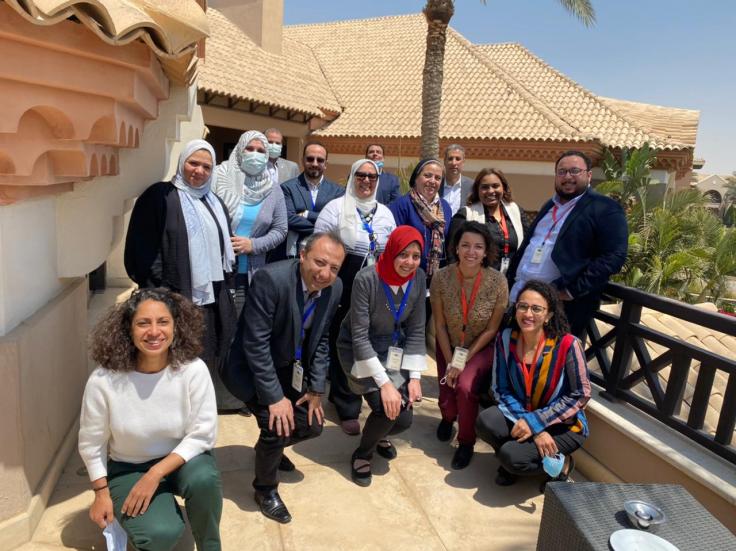
Catalyzing the use of evidence for effective business training and finance in Egypt

Alison Fahey and Lobna Kassim reflect on the successful partnership between J-PAL MENA at AUC and the MSME Development Agency to create a culture of evidence-based program and policy design.
As the largest provider of micro, small, and medium enterprise (MSME) finance and training in Egypt expands its programs, it has an opportunity to apply evidence about which approaches are most effective to ensure that its programs have maximum impact. Egypt’s Micro, Small and Medium Enterprises Development Agency (MSMEDA) develops and manages programs funded by the World Bank, the European Union Delegation in Egypt, KfW Development Bank, and others, and is at the center of policy making, legislation and national survey designs related to MSMEs.
MSMEDA coordinates support to the 3.7 million MSMEs in Egypt, which employs an estimated 9.7 million employees receiving salaries estimated at around EGP 119.2 billion. Microenterprises dominate the sector: 94% of MSMEs are microenterprises which employ 79% of the total MSME workforce. Research has shown that microenterprises are growing into small and medium enterprises, but not fast enough to absorb the increase in the total labor force. Microenterprise take-up of financial and non-financial services is lower than expected by policy makers.
J-PAL Middle East and North Africa, based at the American University in Cairo, has partnered with MSMEDA to evaluate its flagship programs, host customized training, and discuss policy priorities and corresponding research questions, with the aim to create a culture of evidence-based program and policy design, with support from the European Union. On October 28, 2021, J-PAL MENA at AUC and MSMEDA hosted a roundtable discussion with key development partners and donors to reflect on our successful partnership and set together a forward-looking research agenda around MSMEDA’s priorities: formalization, digitization, and targeting of MSMEs.
Evaluating flagship programs

In 2017, J-PAL MENA conducted randomized evaluations of two interventions under MSMEDA’s “Emergency Employment Investment Project,” supported by the EU and World Bank. The evaluation tested the impact of business and vocational skills training, capital assistance, and counselling on self-employment.
While global evidence on similar interventions is limited and mixed, our researchers found that the MSMEDA intervention increased employment four times higher than the control group, increased income by 55%, and decreased intention to migrate by 11%, 10 months after the intervention. However, the addition of counseling did not amplify the effects compared to training and capital assistance alone.
Long term results four years after the intervention show persistent positive impact on labor market outcomes, and particular improvement in women’s outcomes and social empowerment, but no longer detected an impact on likelihood to migrate.
Results from this evaluation were used by MSMEDA and the World Bank in designing evidence-based programs and in fundraising discussions, according to Medhat Massoud, Head of Community and Human Development in MSMEDA, and Nahla Zeitoun, Senior Specialist at the World Bank. Informed by the results, MSMEDA now incorporates business skills training in new programs it is designing because they have evidence to support its effectiveness. And in light of minimal findings on the impact of counseling, they discourage the NGOs they work with from incorporating counseling in the form evaluated.
Based on the success of this evaluation and the usefulness of the results, the EU, represented by Ville Suutarinen, Program Manager, announced its plan to support a new randomized evaluation of MSMEDA’s EU-funded program “Addressing the Root Causes of Irregular Migration.” The evaluation tests the impact of cash-for-work, training, and employment programs on youth's labor market outcomes and their perceptions towards irregular migration.
Hosting customized trainings and identifying key questions

Building on these evaluation collaborations, MSMEDA and J-PAL MENA, with support from the EU, is building staff members’ capacity to translate rigorous research into useful policy recommendations and identify evidence gaps for future evaluations. J-PAL MENA delivered a three-day training on the Foundations of Randomized Evaluations, over two rounds for more than 25 members of MSMEDA’s senior management teams. The in-person training was presented fully in Arabic for the first time in the history of the course.
Beside providing an in-depth look at why, when, and how randomized evaluations can be used to rigorously assess the impact of MSMEDA programs, the training allowed participants to design evaluations of their priority programs. Topics discussed included offering incentives to formalize, digital marketing training, and microfinance products tailored to the needs of women and more religious communities.
The way forward: an agenda for evidence generation on policy priorities

Building on topics emerging from the training and discussions with Heads of Central Sectors in MSMEDA, three key policy priorities have emerged for future collaboration: firm formalization, digitization of products and services, and targeting high-growth MSMEs.
At the October roundtable, Tarek Shash, Deputy Executive Director at MSMEDA, presented these priorities, updates from relevant legislation, and new MSMEDA programs; Sylvain Merlen, Resident Representative of UNDP Egypt, shared debates on program design to formalize and digitize MSMEs, and Alison Fahey, Executive Director of J-PAL MENA, shared global evidence on these topics. Through a facilitated discussion with all attendees, we defined priority open questions for future impact evaluations to inform MSME development and MSMEDA programming.

